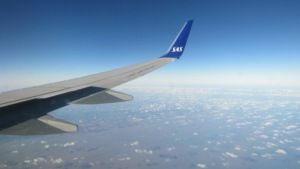News
SAS grounds flights to Germany today as airline inks massive deal with Airbus
This article is more than 7 years old.
Airline struggling in latest Flightstats punctuality figures

On time, 72.94 percent of the time (photo: SAS)
The Scandinavian airline SAS has grounded all of its Scandinavian departures to the German cities of Frankfurt and Munich today due to an ongoing public sector strike in Germany.
The flights affected by the cancellations can be rebooked, wrote the airline in a press release.
The strike has had a massive impact on the German airline Lufthansa, which has been forced to cancel more than 800 of its scheduled 1,600 flights today.
READ MORE: Denmark unlikely to adopt Sweden’s air travel tax
New planes secured
Meanwhile, it’s unlikely that grounding woes are the talk of the SAS offices at the moment.
That’s because it has just been revealed that the airline has ordered 50 new Airbus 320neo airplanes at a cost of nearly 24 billion kroner.
Some 35 of the planes will be purchased outright and are scheduled to join the airline’s fleet by 2023, while the remaining 15 will be leased between 2019 and 2021.
The new aircraft use 15-20 percent less fuel that the aircraft they will replace.
READ MORE: Aarhus Airport lands massive SAS expansion deal
Punctuality problems
In related news, SAS has expressed its dissatisfaction with its punctuality figures for March, during which a quarter of its flights were delayed.
According to the latest stats from Flightstats (here in English), SAS flights arrived on time just 72.94 percent of the time – well outside the top 10 in Europe.
Aegean Airlines (Greece) topped the punctuality stats for March with an 88.13 percent on-time rating, followed by Air Baltic (Latvia), KLM (the Netherlands), Alitalia (Italy) and Transavia (the Netherlands).
Air Europa (Spain), Volotea (Spain), LOT (Poland), Eurowings (Germany) and Vueling (Spain) completed the top 10.
Other notables included British Airways (77.51), easyJet (77.15), Icelandair (71.93), Air France (76.66) and Finnair (76.59).
Elsewhere, Norwegian also fared poorly with a 70.04 percent punctuality rating, while Europe’s biggest airline, Ryanair, doesn’t wish to co-operate with Flightstats and therefore has no punctuality rating.
The contentious Irish budget airline is again eyeing up a base in Copenhagen after promptly shutting down its base in the Danish capital in 2015 over union pressure.










































